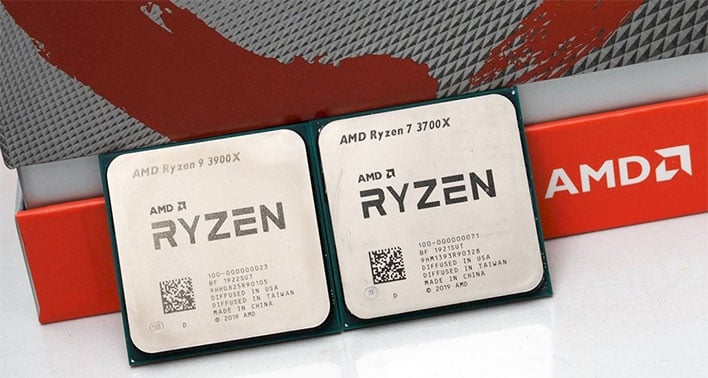AMD Ryzen 3000 Zen 2 CPU Survey Suggests Many Chips Are Not Reaching Top Boost Speeds

Prominent overclocker and enthusiast Roman Hartung, who goes by "der8auer" online, recently conducted a survey of AMD Ryzen 3000 CPU owners to see how many people are hitting the advertised boost clocks on their chips. The results are a bit surprising. If we are to take the survey at face value, then many third-generation Ryzen processors are never reaching their top speeds.
Around 2,700 people participated in the survey, most of which reported their findings from running a Ryzen 7 3700X processor. It is one of five Ryzen 3000 chips represented. Here's a breakdown...
- Ryzen 9 3900X: 26 percent
- Ryzen 7 3800X: 8 percent
- Ryzen 7 3700X: 40 percent
- Ryzen 5 3600X: 6 percent
- Ryzen 5 3600: 21 percent
Those numbers are rounded, which is why they add up to 101 percent. Nevertheless, we can see that two-thirds of the participants reports results for either a Ryzen 7 3700X or Ryzen 9 3900X (in that order), at 66 percent.
Der8auer instructed participants to run the single-core test in Cinebench R15, a popular benchmarking program that does a good job of hammering cores and threads. There is actually a newer version available, Cinebench R20, but for whatever reason he decided to stick with the R15 release. He then asked users to take note of the maximum clockspeed, as reported by HWInfo.
So, what happened? In most cases, users reported not seeing their CPUs reach the maximum advertised clockspeeds. They came close in many instances, sometimes within 25MHz. But a surprising number of respondents indicated their CPUs simply did not reach the max boost clock.
The best results came from the Ryzen 5 3600, where about half of the users (270 out of 542, or 49.8 percent) reported seeing the CPU hit its top advertised speed. On the opposite end of the spectrum, a mere 5.6 percent of Ryzen 9 3900X owners indicated that their CPUs hit the top speed, as plotted in the graph above. Most came within 100MHz, but there were many who saw max speeds further way from the max advertised clock.
Among available Ryzen 3000 processors, the Ryzen 9 3900X has the highest advertised boost clock at 4.6GHz, so it is of particular interest (especially with the not-yet-available Ryzen 9 3950X upping the ante to 4.7GHz). Yet according to the survey, very few chips are actually hitting that speed under load.
Does It Matter?
There are several things to consider here. First, there is the methodology and validity of the survey itself. AMD raised some questions to der8auer, including how he can be sure participants are using the correct Windows 10 version, as one of the later updates instructs the Windows scheduler to use the fastest core for single-threaded workloads (AMD had previously denied the scheduler was ever an issue). From der8auer's perspective, the Windows versions should not matter, unless AMD caveats its max boost clock claims.
The bigger concern is how many people participating in the survey are users who are mad that their CPUs are not hitting the top advertised clocks. One of the inherent flaws with surveys is they tend to attract extreme representations—in this case, it's plausible that scorned users were more likely to have participated. However, der8auer counters that many of the comments suggest people wanted to see AMD in the best light—they're fans, in other words—though he does acknowledge it's a valid concern.
There are other factors that come into play as well, namely the specific motherboard and what BIOS revision a person is running. There's also some related controversy. Over on Overclock.net, an ASUS employee made the claim that AMD scaled back how aggressively its third-gen Ryzen processors boost for "long term reliability."
"Every new bios I get asked the boost question all over again. I have not tested a newer version of AGESA that changes the current state of 1003 boost, not even 1004. If i do know of changes, I will specifically state this. They were being too aggressive with the boost previously, the current boost behavior is more in line with their confidence in long term reliability and I have not heard of any changes to this stance, though I have heard of a 'more customizable' version in the future," the employee wrote.
Another thing to keep in mind is that AMD's advertised boost clock is based on a single core being able to hit that speed. In addition, chips typically only maintain a top boost clock briefly. Obviously it's a bummer if most chips are not actually ever hitting their advertised speeds, but as far as real world performance goes, there is plenty more to consider—typical speeds, core and thread counts, the underlying Zen 2 architecture, and of course bang-for-buck.


